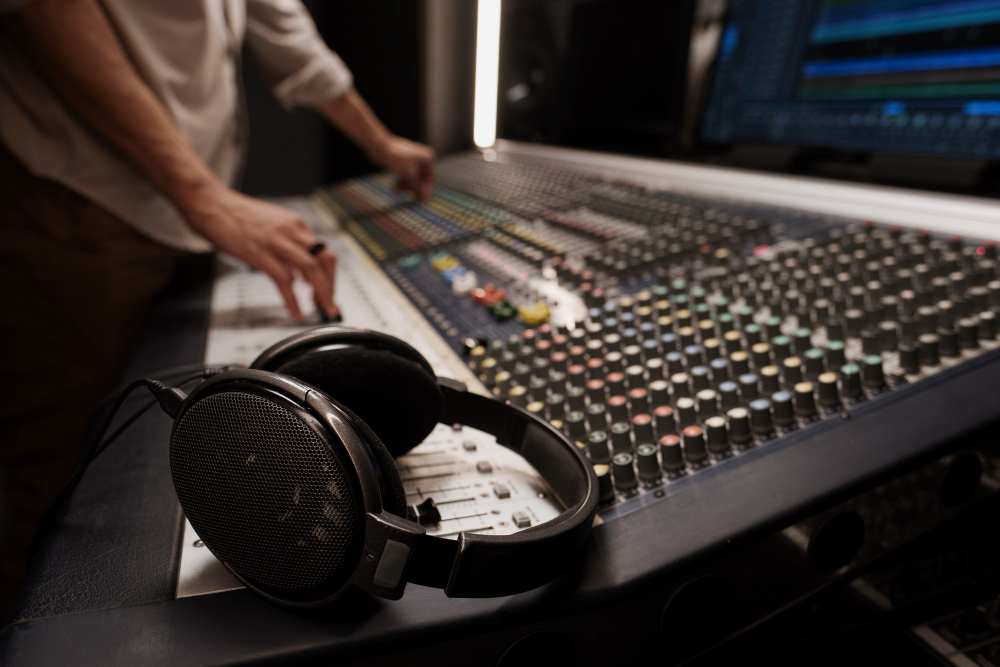Whether you're passionate about studio work, live sound, sound design or audio for film and games, this degree equips you with the creative and technical skills to work in a wide range of sound-related careers.
What You Study
Courses vary in focus depending on the university - some lean more towards music and composition, others toward engineering and media production. Key areas typically include:
Core Topics:
-
Studio recording techniques
-
Mixing and mastering
-
Music technology and software (e.g. Logic Pro, Pro Tools, Ableton, Cubase)
-
Digital audio workstations (DAWs)
-
Live sound engineering
-
Microphone techniques and acoustics
-
Sound design for film, games and TV
-
Electronic music production
-
Composition and arranging (in some programmes)
Additional Themes May Include:
-
Music theory and song-writing
-
Music business and copyright
-
Audio post-production
-
Psychoacoustics and sound perception
-
Interactive audio and immersive environments (e.g. VR/AR)
You’ll spend a lot of time in:
-
Recording studios
-
Computer labs
-
Mixing suites
-
Live sound environments
-
Group projects with musicians, filmmakers or game developers
Useful A-Levels (or equivalent qualifications)
Entry requirements vary. Some courses are highly creative, others are more technical. Useful subjects include:
-
Music or Music Technology
-
Physics (for acoustics-heavy or engineering-focused courses)
-
Media Studies or Film
-
Computer Science (helpful for sound design and audio programming)
-
BTECs in Music Production, Creative Media or Performing Arts are widely accepted
A portfolio or showreel is often required, showcasing tracks you’ve produced, mixed, or recorded.
What Makes a Strong Application
To stand out:
-
Show passion and experience with sound and production tools
-
Include details of:
-
Music or sound you’ve recorded, produced or mixed
-
Use of DAWs or studio equipment
-
Collaboration with artists, filmmakers, or game designers
-
Any live sound experience (e.g. school productions, gigs, festivals)
-
-
If asked for a portfolio, quality and originality matter more than polish
-
Demonstrate your creativity and willingness to learn new tools and techniques
Career Prospects
Sound and Music Production leads to a wide range of careers across the creative industries, including:
-
Music industry:
-
Music producer
-
Mixing or mastering engineer
-
Recording studio engineer
-
Sound designer for artists or DJs
-
-
Media and entertainment:
-
Audio post-production for TV, film or streaming
-
Sound editor for broadcast or advertising
-
Composer or audio designer for games
-
-
Live sound and events:
-
Live sound engineer for concerts or theatre
-
AV technician
-
Tour or venue audio manager
-
-
Other roles:
-
Audio branding
-
Podcast production
-
Music education or technical support
-
Transferable skills include:
-
Audio editing and sound manipulation
-
Technical problem-solving
-
Collaboration and creative communication
-
Project management and attention to detail
-
Working to deadlines under pressure
Studying in the UK vs Other Countries
UK
-
Home to a vibrant music and media industry
-
Strong courses at universities like Leeds Beckett, BIMM, Liverpool Institute for Performing Arts (LIPA), Salford, and Southampton Solent
-
Many courses accredited by JAMES or connected to industry partners
-
Excellent facilities: pro-level studios, live rooms, post-production suites
USA
-
Often studied through Recording Arts, Music Technology, or Audio Engineering degrees
-
Famous schools include Berklee College of Music, Full Sail University, NYU and USC
-
Emphasis on industry connections and specialist facilities
Canada
-
Music production taught at both universities and colleges
-
Sheridan, Ryerson, and McGill offer strong programmes
-
Co-op options and links to music/media hubs like Toronto and Vancouver
Australia and New Zealand
-
Offered as part of Music, Creative Arts or Audio Production degrees
-
Hands-on, industry-focused with strong tech and music business integration
-
Institutions like SAE, JMC Academy and RMIT have specialist programmes
Europe
-
English-taught music production degrees available in the Netherlands, Sweden and Germany
-
Strong focus on electronic music and sound art in some regions
-
Affordable tuition in many EU countries, with growing international student communities
Final Thoughts
Sound and Music Production is ideal for students who:
-
Are passionate about the technical and creative side of audio
-
Love music, sound, and storytelling through sound design
-
Enjoy working both independently and in collaborative environments
-
Want to build a portfolio that reflects their unique sound and vision





